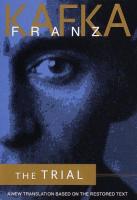
The Trial by Franz Kafka follows the surreal and nightmarish journey of Josef K., a seemingly ordinary man who is arrested by mysterious agents for an unspecified crime. Throughout the novel, Josef navigates a bewildering and absurd legal system, facing a series of bizarre and surreal trials without ever being informed of the charges against him. The narrative unfolds in a disorienting and dreamlike manner, exploring themes of bureaucracy, power, and the absurdity of the legal system. Kafka's work is a haunting exploration of the individual's struggle against an incomprehensible and oppressive authority, creating an atmosphere of existential dread and uncertainty that has made The Trial a classic of existential literature.
The most compelling aspect lies in Kafka's ability to evoke a sense of disorientation and helplessness within the reader, mirroring the protagonist Josef K.'s journey through a nightmarish legal labyrinth. The novel's ambiguity and enigmatic nature contribute to its enduring allure, leaving room for various interpretations. The only disappointment I had was how unclear the conclusion was, because it made the book seem like it didn’t have an ending. I would recommend The Trial to readers who appreciate thought-provoking and unconventional narratives, especially those drawn to existentialist literature. It's a book that lingers in the mind, inviting anyone to grapple with its enigmatic themes and leaving them with a haunting sense of the absurdity that can permeate the human experience. Those who enjoy exploring the complexities of the human psyche and the surreal landscapes of existential literature will find The Trial to be a compelling and memorable read. I give this book a four out of five stars.
